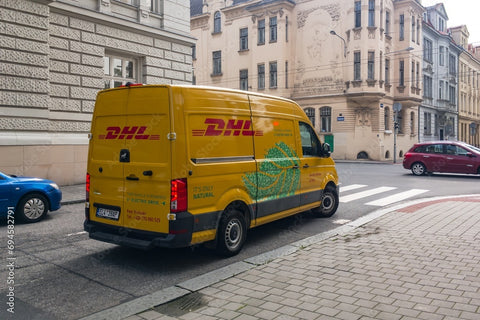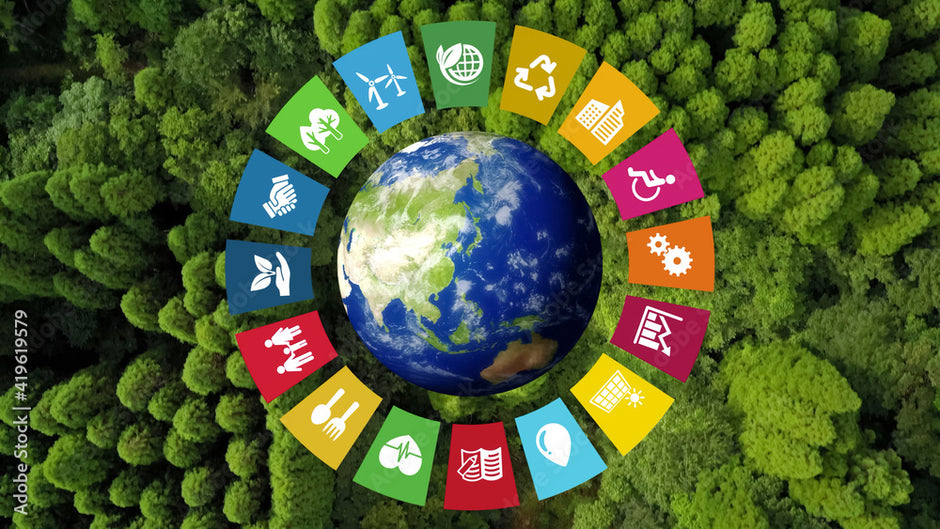In today's world, climate change is a hot topic, and it's more important than ever to think about the effect of our actions on the environment. One way to do this is by examining our CO2 footprint. Our CO2 footprint is the total amount of carbon dioxide (CO2) emissions produced as a result of our daily activities. The emissions per person are measured by the amount of energy consumption, transport, and product production.
By understanding our CO2 footprint, we can take steps to reduce our impact on the environment and contribute to a more sustainable future. In this article, we'll delve deeper into the concepts of CO2 and CO2 footprint. Additionally, we'll provide more insight into the CO2 footprint of the production and delivery of Bamboi toilet paper, to show that Bamboi toilet paper also contributes to reducing CO2 emissions. Small changes in our daily routine - such as choosing a product with a lower CO2 footprint - can already make a difference.
What is CO2?
First, it's important to understand what carbon dioxide (CO2) actually is. CO2 is a natural gas that is vital for the Earth's atmosphere and climate system. This natural gas is produced by burning fossil fuels such as coal, oil, and natural gas, but also by other human activities such as deforestation and cement production. While CO2 is necessary for the survival of plants and other organisms, increased CO2 levels in the atmosphere contribute to global warming and climate change.
When fossil fuels are burned, large amounts of CO2 enter the atmosphere, resulting in an increase in average global temperature and changes in weather patterns. This has a series of negative consequences for the environment: from rising sea levels, increase in extreme weather conditions to damage to public health and loss of biodiversity.

CO2 footprint
A CO2 footprint is a measurement of the total amount of greenhouse gases, primarily carbon dioxide (CO2), produced as a result of human activities. The term "footprint" is used to describe the impact that a person, household, company, or country has on the environment. A CO2 footprint takes into account all sources of emissions, such as energy use, transport, and food production, and calculates the total amount of CO2 released into the atmosphere as a result of these activities. The goal of reducing the CO2 footprint is to minimize the effect on the environment by slowing down the process of climate change. You do this by reducing the amount of greenhouse gases released into the atmosphere. By understanding the CO2 footprint, individuals and organizations can make informed decisions about how they can reduce their impact on the environment and contribute to a more sustainable future.
CO2 footprint of our production
The CO2 footprint of Bamboi bamboo toilet paper refers to the amount of carbon dioxide (CO2) produced during the production of our toilet paper. Bamboo toilet paper is generally considered to have a lower CO2 footprint compared to traditional toilet paper made from tree pulp, because bamboo is a fast-growing, renewable source that requires less energy and fewer chemicals to process. Bamboo is also a powerful natural CO2 storage that keeps the air clean. Bamboo stores 35% more carbon and releases 35% more oxygen than trees. Additionally, the CO2 footprint depends on the type of bamboo, the production process and the transport of the toilet paper. Bamboi toilet paper is tree-free, chemical-free, hypoallergenic and CO2 negative. We have conducted an LCA analysis of our product which shows that the stored CO2 in the bamboo is greater than the emissions from production and transport combined. Therefore, Bamboi® toilet paper ultimately reduces CO2.
CO2 neutral delivery
CO2-neutral delivery refers to a delivery method that neutralizes or compensates for the carbon dioxide (CO2) emissions during the transport of goods. This is achieved by calculating the total amount of CO2 emissions produced during the delivery process and then offsetting these emissions through investments in renewable energy projects, for example. The goal of CO2-neutral delivery is to reduce the carbon footprint of goods transport and limit the impact of the delivery process on the environment.
By neutralizing CO2 emissions, companies can demonstrate their commitment to sustainability and work towards an environmentally friendly future. Moreover, CO2-neutral delivery can help companies reduce their total CO2 footprint and achieve sustainability goals.
Bamboi toilet paper is delivered by DHL Go Green Solutions. This is an initiative by the delivery service DHL, through which they strive for a positive climate movement. They are committed to "reducing CO2 emissions, for example by building sustainably and only using electric delivery vans in the near future". Since 2022, all DHL parcel shipments have been climate neutral, including Bamboi toilet paper shipments.

CO2 emissions and bamboo
Bamboo has several advantages when it comes to reducing the CO2 footprint in the production of consumer goods, including toilet paper. Bamboo is a fast-growing and renewable resource, meaning it can be harvested and replenished quickly, reducing the need to cut down new trees for paper production. Bamboo also requires less energy and fewer chemicals to process compared to wood pulp, further reducing the environmental impact. Moreover, bamboo is naturally pest-resistant and requires less water than trees, making it a more sustainable crop.
This not only reduces the CO2 footprint in the production of bamboo-based products but also has positive environmental effects that go beyond just reducing emissions. By using bamboo as a raw material, manufacturers can help reduce the CO2 footprint of their products and have a positive impact on the environment. Furthermore, using bamboo-based products, such as toilet paper, can help raise consumer awareness about the importance of sustainability and the impact of their purchasing decisions on the environment. Want to contribute to reducing the CO2 footprint? Then order Bamboi bamboo toilet paper in our webshop. Read more about Forest Stewardship Council (FSC) and Bamboi.




































